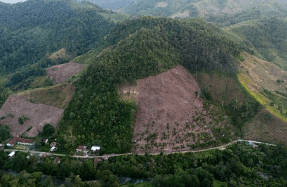‘We need reparations now’: Tulsa wants to dismiss lawsuit from massacre survivors. They’re still fighting

When Joe Biden visited the city to commemorate the 100th anniversary of a racist massacre that displaced thousands of Black residents and killed as many as 300, Tulsa civil rights attorney Damario Solomon-Simmons said he told the president that “we don’t need any more studies, we don’t need any more commissions, we don’t need any more meetings.”
“Our people have been clear,” Mr Solomon-Simmons told reporters on 2 June. “We need reparations, and we need reparations now.”
The attorney represents the massacre’s three known survivors, an historic African American church and descendants of victims seeking reparations from the city and state after decades of neglect and festering racial disparities that followed 14 hours of violence in 1921.
The city, state and other defendants, including the Chamber of Commerce and county sheriff’s office, have filed several motions to dismiss the lawsuit in Tulsa County District Court.
Lawsuits seeking reparations for the victims of the massacre were also dismissed in 2003 and 2004.
Now, attorneys are pointing to a “public nuisance” statute that the state invoked in its own lawsuit against drugmakers for the opioid crisis.
Decades of harmful urban renewal initiatives that squeezed Black residents from their neighbourhoods, construction of a federal highway that segregated north Tulsa from its largely white southern districts, and lingering health disparities and other discriminatory policies can be traced to the racist violence that fuelled a white mob in 1921, attorneys argue.
“All of these things are part of a public nuisance that continues today,” said MacKenzie Haynes of the law firm Schulte Roth & Zabel.
Attorneys intend to use the “exact same methodology and principles the state used” in its litigation against pharmaceutical companies, she said.
A 2001 commission tasked with investigating the massacre said the mob “set fire to practically every building in the African American community, including a dozen churches, five hotels, 31 restaurants, four drug stores, eight doctor’s offices, more than two dozen grocery stores, and the Black public library.”
“Our survivors were victims and witnesses to the worst act of domestic terrorism this country has ever seen,” Ms Hayes said. “They were witnesses to murder, to arson, to other heinous crimes.”
Michelle Brooks, communications director for the mayor’s office, told The Independent that the city does not comment on pending litigation.
Asked during a press conference on Tuesday what is “complicated” about reparations for the survivors and the families, Mayor GT Bynam said: “What’s complicated about it is, where does the money come from, what’s the source of it, who does it get paid to, how do you calculate who it gets paid to?”
He added: “This is not something that there is a tremendous track record in our history around. … Should this generation of Tulsans be taxed for something that criminals did 100 years ago?”
A commission appointed by the Oklahoma state legislature in 1997 spent nearly four years investigating the massacre before issuing four major recommendations to state and local governments, including guidance to make direct payments to survivors and their families.
Most of the recommendations never fully materialised, or have fallen short of community demands and expectations. None of the survivors or their families have received any direct payment.
The failure to provide comprehensive reparations – and efforts from city and state officials to raise millions of dollars for museums and tourist attractions that profit from the atrocities – have only compounded the harms, according to attorneys and advocates for the survivors.
Advocates for the survivors have accused city officials of misappropriating survivors’ images to promote the massacre’s centennial.
A Centennial Commission’s fundraising efforts collected more than $30m to commemorate the massacre, with $20m to construct a centrepiece Greenwood Rising History Center.
“The people who suffered are not reaping any of the benefits,” Ms Haynes said. “There is cultural tourism being created in Tulsa, and that’s wrong. People should be compensated if their stories and images and likenesses are being used. … We are asking our defendants to stop, to give up the resources they have received or achieved as a result of using the likenesses and names and images of survivors and descendants, and giving it back to the people it belongs to.”
Human Rights Watch has issued several reports about the calls for reparations and the persistent economic and health disparities among Black Tulsa residents compared to white residents.
The president did not bring up reparations during his emotional remarks in Tulsa on 1 June. Instead, he discussed the administration’s wide-ranging economic agenda and efforts to combat racial disparities and discrimination.
The House of Representatives will consider a measure from US Rep Sheila Jackson Lee to form a commission to study reparations, marking a milestone recognition from the federal government to recognise slavery’s legacy and apologise for it.
Members of the Congressional Black Caucus discussed reparations with the president during a recent meeting, but it’s unclear how much the administration will commit to the commission’s passage, and beyond.
Before the president’s remarks in Tulsa, White House deputy press secretary Karine Jean-Pierre told reporters that he “supports a study” but “believes that, first and foremost, the task in front of us ... is to root out systemic racism where it exists right now.”
Human Rights Watch researcher Dreisen Heath said she was “extremely disappointed” at the calls for reparations from survivors and the Greenwood community were largely “ignored [and] unfulfilled” by the president in his remarks.
“It’s not enough to reiterate the truth,” she said.
“Narrative change is good, but these statements fall on deaf ears amidst the visible intergenerational pain [and] trauma survivors [and] descendants of the massacre are experiencing,” she added.
The call for justice is reparations and “nothing less,” she said.






